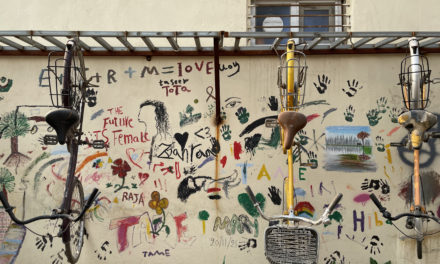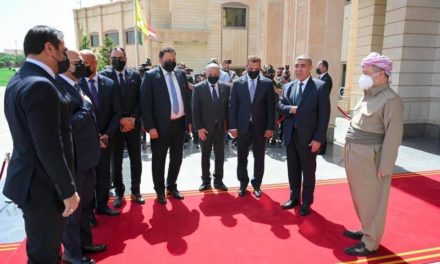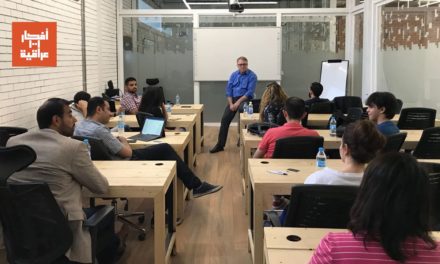More than five months after elections, Iraq’s new government is taking shape. With the announcement of 14 cabinet picks and their parliamentary confirmation, Prime Minister Adil Abdul-Mahdi can begin governing. He has his work cut out for him. Fifteen years after the U.S. invasion, Iraqis remain frustrated at poor or inadequate government services, corruption and the seeming impunity of the ruling class. No longer can even Shi’ite and Kurdish politicians expect constituents to excuse their failings as the price of ridding the country of Baathist dictatorship. After all, 40 percent of Iraqis were born after Saddam’s fall. Well over half of Iraqis have no direct memory of Saddam Hussein. Rather than compare their plight to times past, Iraqis instead take the freedom to criticize for granted and compare their standard of living to Iran, Turkey, and the Gulf countries.
Is Fuad Hussein competent to take on finance?
Iraqis debate Abdul-Mahdi’s longevity: Not only is he more than a decade older than his predecessor, Haider Abadi, he also resigned from his two previous posts. Circulating around Baghdad earlier this month, it seemed many politicians were jockeying as much for posts in Abdul-Mahdi’s government as they were positioning themselves for his fall. After all, patience is thin and the clock is ticking: The summer surge in electrical demand is only seven months away. Abdul-Mahdi’s promises to preside over a technocratic government and his announcement that he would move his office outside the Green Zone are meant to assuage a cynical public. But, while his symbolism might be apt, his choice of Fuad Hussein as finance minister suggests political weakness and the need to appease Kurdistan Democratic Party (KDP) leader Masud Barzani will trump any meaningful effort to tackle corruption or continue Abadi’s economic reforms.
Hussein’s main credential was that he was for more than a decade chief-of-staff—essentially, consigliore—to Barzani. By education, he is a teacher rather than economist or engineer. If service to Barzani was his only credential, it would suggest emptiness to Abdul-Mahdi’s rhetoric about prioritizing technocratic ability over patronage. But, after years being partner to if not supervising implementation of every major Kurdistan Regional Government (KRG) policy, the track record of the policies Hussein championed in the KRG are worth examining. Because the KRG became free from Baathist rule 12 years before the rest of Iraq and remained both secure and stable while insurgency raged through newly-liberated areas of the country, the Kurdish region had an economic head start upon the rest of Iraq. Alas, through both corruption and poor economic policy, KRG squandered that lead. Consider, for example, that the KRG is on par with Cuba in terms of percentage of residents on the state payroll. While Abadi was working to reduce payroll and create incentives—a private pension scheme for example—to ensure financial stability at times of lower oil prices, the KRG increased its dependence on oil.
Did the KRG mishandle oil contracts and revenue?
While the KRG sold itself as “an emerging market offering excellent opportunities,” oil industry corruption has also tarnished Iraqi Kurdistan’s reputation. On November 27, 2015, for example, Dana Gas, a United Arab Emirates-based energy company and one of the largest investors in Iraqi Kurdistan, won a London Court of International Arbitration ruling worth nearly $2 billion against the KRG. The case exposed bribery and extortion at the highest levels of the KRG. If Hussein was unaware of the corruption, he was either blind or incompetent. If he was complicit, then that bodes no better for his tenure at the finance ministry. The problem, of course, was not just corruption. The Dana impasse and arbitration caused a six-year delay in development, which meant lost profits on undeveloped fields and dissuaded further investment in Kurdistan.
While the KRG subsequently blamed defaults on the fight against the Islamic State and the pressures of caring for refugees, profligate spending by Kurdish political elites and the lack of austerity at top levels of the KRG belied such claims. KRG Oil Minister Ashti Hawrami acknowledged, “If the KRG carried on as before with its uncurbed spending and without real reforms, then even if we reached 1 million barrels of crude oil production per day and oil returned to $100 per barrel we would still not cover our financial requirements”. The KRG contracted PricewaterhouseCoopers to audit the region but never released the results of its audits. Nor did the KRG release audits by Deloitte and Ernst & Young. Given Hussein’s central role in managing government at the time, shouldn’t Abdul-Mahdi demand their release and parliamentary examination? Given the Iraqi public’s sensitivity about corruption, shouldn’t Abdul-Mahdi seek to have his finance minister explain the difference between Barzani, KDP, and public party in the KRG? Perhaps parliament might ask why, if Barzani no longer serves as KRG president, he continues to occupy a mountaintop resort appropriated first by Saddam and then, after 1992, for the KRG presidency?
Will Fuad Hussein forgo prudence to Barzani demands?
Not all KRG financial failure can be laid at Hussein’s team. Hussein, after all, was simply a cog in corrupt KRG machinery, albeit a prominent one. And, during the time of Hussein’s service, an oil dispute between Baghdad and Erbil led the Iraqi government to withhold cash transfers to the KRG. This alone did not leave the KRG in such dire financial straits, but it does raise further questions about Hussein’s intentions. Does Hussein support the Iraqi government position that the KRG is due 12.67 percent of Iraqi oil revenue, or does he support reversion back to 17 percent, a figure not commensurate with KRG population? If the latter—and it is likely this is why Barzani fought to place his nominee in the finance ministry—then what would this mean for the Iraqi budget? Should the shortfall come from electricity generation or water sanitation? Should there be less money to rebuild Mosul? Or should the government hire fewer teachers? Iraqis deserve to know whether Abdul-Mahdi, his rhetoric aside, has betrayed their demands for a clean government and transparent finances in order to win Barzani’s support.
Will Fuad Hussein continue to discourage modern banking?
No Iraqi prime minister has inherited as healthy an Iraqi economy as did Abdul-Mahdi. Prime Minister Nouri al-Maliki had run Iraq’s economy largely into the ground and when Abadi took over, not only had oil prices crashed, but the Islamic State precipitated a national emergency. While Abadi stabilized the Iraqi economy and helped make Iraq investor-friendly, Western businesses say the missing piece in Iraq is a modern banking sector. But, while modern banking lags in Iraq, in Iraqi Kurdistan it is positively old-fashioned. Alas, for the KRG, this was by design. Kurdistan remains largely a cash society; credit cards are rarely accepted and cash machines rare. To collect salaries, many Kurds must queue in their offices, peshmerga must go to force headquarters, and police must visit their directorate. Pensioners likewise must show up every month or two to collect what they are owed. It need not have been this way. When, six years ago, a representative from one of the United Kingdom’s top companies offered to install a network of ATMs and electronic banking centers—more than 1,500 in all—across Kurdistan, the KRG refused. The issue was not expense: The company would have provided the machines for free and sought only a miniscule commission on transactions at less than one-percent, far less than the going international rate.
Rather, the apparent reason for Barzani’s refusal was that electronic banking would have ruined ghost employee and embezzlement schemes and also undercut efforts to monitor suspicious cash. When electronic banking is the norm, watchdogs can question, for example, how it could be that a mid-level government employee suddenly deposited $100,000 into his account. Given Hussein’s record obscuring corruption rather than exposing it, can international partners and investors expect any significant progress modernizing Iraq’s banking sector?
How does Fuad Hussein propose tackling corruption?
While almost every Iraqi complains about corruption, prosecuting corruption is more than a matter of political will. Outdated laws hamper the anti-corruption fight in Iraq. Iraqi Criminal Code No. 111 of 1969, section one, focuses on bribery the penalty for which is a maximum of ten years in prison and confiscation of the bribe. Section two addresses embezzlement for which penalties range from a fine to life imprisonment with a restitution of the funds stolen, and section three criminalizes “officials who overstep the bounds of their duty” and misuse public authority. Article 330 deals with the common Iraqi practice of wasta, the use of connections to avoid application of law. But, Iraq’s penal code has not been updated to address cross border crimes, cybercrimes, or basic conflicts of interest such as the common Iraqi practice of using sons, cousins, or in-laws as business agents for politicians. If Abdul-Mahdi and Hussein are serious about fighting corruption, what new laws or amendments will they or the parties supporting them submit to parliament to update Iraq’s legal code?
Will Fuad Hussein exploit Abdul-Mahdi’s style?
Abdul-Mahdi enters office with a very different leadership style than his predecessors. Maliki sought to pepper the bureaucracy with loyalists and created an informal, shadow cabinet to control policy outside the formal ministries. Abadi, meanwhile, could call up the minutiae of technical details of financial reform, the oil industry, and infrastructure. While many Iraqis complained about backlogs of decisions in the prime minister’s office, without exaggeration, Abadi often had a better grasp of ministry portfolios than many ministers. Abdul-Mahdi, however, delegates. His goal is to allow ministers to run their portfolio and sink or swim by his results. If the ministers were technocrats and had the betterment of Iraq as their goals, that might be noble. But Fuad Hussein is neither a technocrat nor does he have a track record of economic success. He was pivotal to efforts to dismantle Iraq just over a year ago. Perhaps Barzani forced Hussein upon Abdul-Mahdi as the price of his political support. That Abdul-Mahdi violated his promise not to engage in the usual political horse-trading surprises no one, but it bodes poorly that he did not hold firm to demand a more competent figure. Abdul-Mahdi may mean well, but sometimes it is the early compromise which determines whether a prime minister will succeed or not. Alas, Abdul-Mahdi’s compromise gives little reason for optimism, at least in the financial and anti-corruption spheres.

Michael Rubin
Michael Rubin is a resident scholar at the American Enterprise Institute and a senior lecturer at the Naval Postgraduate School in Monterey, California. He was editor of Middle East Quarterly and is author of Kurdistan Rising? (AEI, 2016). His most recent book chapter is on the history of KRG corruption in Routledge Handbook of the Kurds (Routledge, 2018). He received his Ph.D. in history at Yale University, and previously taught at both the Universities of Sulaymani and Salahuddin in Iraqi Kurdistan.











Michael Rubin raises some important questions. How will PM Abdul Mahdi explain his choice of finance minister to the Iraqi public? Will Fuad Hussein populate the ministry with loyalists? How is he supposed to implement reforms? He can’t possibly improve the Iraqi economy when he, only last year, was advocating for Iraq’s dismemberment.
There is a ticking time bomb in Iraq in the form of population growth and dwindling water resources. If the Iraqi government doesn’t act soon, we could possibly be facing a destabilized south.
I can’t see this government implementing reforms beyond the bare minimum necessary for it’s political survival.
I truly hope I am wrong though.
// Cheers